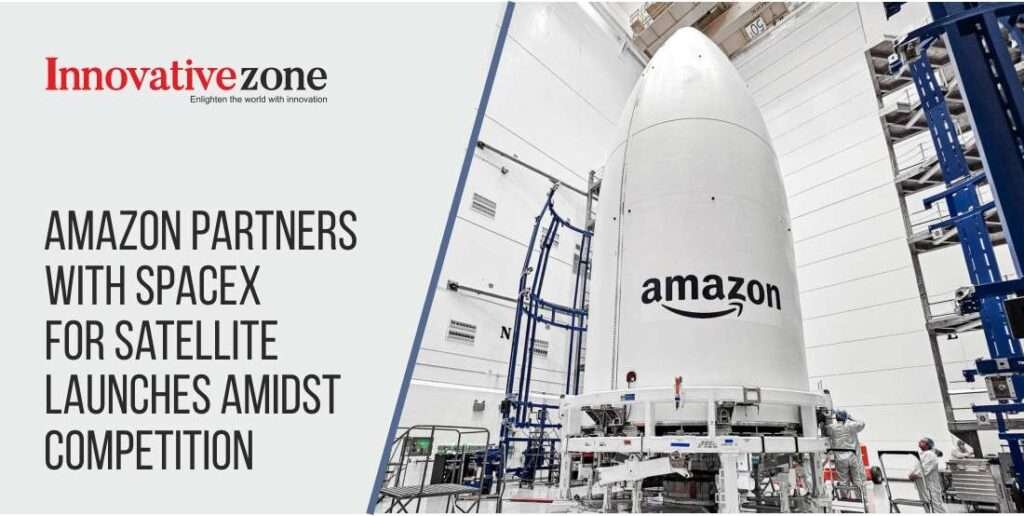Amazon Partners with SpaceX for Satellite Launches Amidst Competition
Written by Sanjay Kumar
In a surprising move, Amazon.com Inc. has inked a deal with its arch-rival, SpaceX, to utilize Elon Musk’s Falcon 9 rocket for three upcoming satellite launches. This strategic collaboration is geared towards bolstering Amazon’s satellite constellation deployment for its ambitious internet-from-space project, as reported by Bloomberg.
The agreement, disclosed on Amazon’s official website last Friday, outlines the e-commerce giant’s reliance on SpaceX, a primary competitor, to propel its satellite constellation into orbit. The scheduled launches, set to kick off in mid-2025, mark a significant shift in the dynamics of the space industry.
Bloomberg’s report also highlighted the operational status of SpaceX’s Starlink, which currently boasts approximately 5,000 satellites providing internet services from low-Earth orbit. In contrast, Amazon’s Project Kuiper, following a similar business model, has recently launched its first two test satellites, with plans to deploy a constellation comprising 3,236 satellites. The beta testing phase with corporate clients is slated for the latter half of the coming year.
Elon Musk, CEO of SpaceX, responded to inquiries, emphasizing the fairness of SpaceX’s approach. In a post on the social media platform X, Musk stated, “SpaceX launches competitor satellite systems without favor to its own satellites. Fair and square.”
Amazon initially aimed to launch its first satellites by the fourth quarter of 2022. However, a series of setbacks, including testing failures and issues with its previous launch partners, have led to delays. In 2022, Amazon entered into agreements with three launch service providers—United Launch Alliance, Blue Origin LLC (founded by Amazon’s Jeff Bezos), and Arianespace—for a minimum of 68 launches, potentially reaching up to 83 launches. These launches were intended to deploy the majority of the Project Kuiper constellation into orbit.
However, this arrangement faced challenges due to the utilization of newly developed rockets, causing delays. In a separate agreement, Amazon utilized United Launch Alliance’s (ULA) Atlas V rocket for its initial two satellite launches in October. Despite the Atlas V being phased out, Amazon has eight more launches scheduled with this rocket.
The decision to collaborate with SpaceX stirred controversy earlier this year when a pension fund filed a lawsuit against Jeff Bezos, Amazon’s board members, and the company itself. The lawsuit alleged that Amazon’s failure to consider reliable SpaceX rockets for Kuiper launches resulted in more expensive and delayed rocket launches. Amazon refuted the claims, stating they were without merit.
As the space industry witnesses this unexpected collaboration between fierce rivals, the dynamics of satellite deployment and space exploration are poised for a transformative period, with implications for both Amazon’s Project Kuiper and SpaceX’s Starlink.
Must Read:-
- Top 10 Largest Oceans and Seas in the World
- Top 10 automobile companies in India 2023
- Top 10 Electrical Companies in India 2023
- Top 10 Real Estate Companies in India-2023
- Top 10 most awaited & upcoming Hindi web series 2023-24
- Top 10 Clothing Brands in India 2023
- Top 10 best cultures in the world-2023
- Top 10 best country to work and live in 2023
- Top 10 best country for education 2023
- Top 10 Most Followed Celebrities on Instagram 2023
- The Inspiring Success Story of Bear Grylls
- Top 10 Business Coaches in The World to Guide Entrepreneurs In 2023
- Top 10 movies based on True Stories you must watch before you die
- Top 10 Best Online Doctor Consultation Apps in USA


